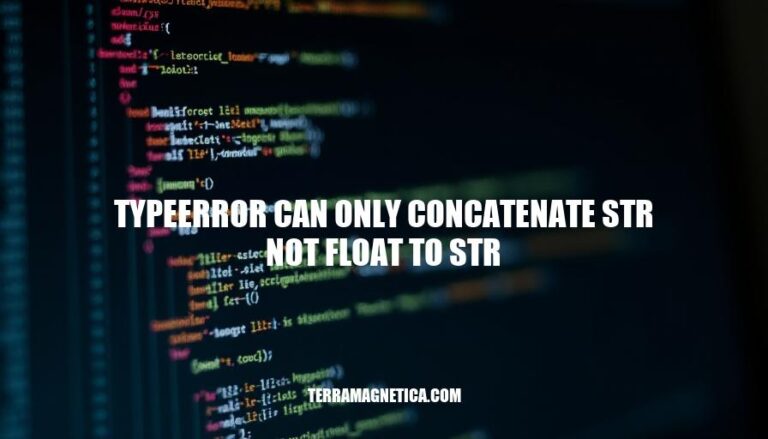


In Python programming, the error message “TypeError: can only concatenate str (not ‘float’) to str” occurs when you try to concatenate a string with a float using the + operator. This error highlights Python’s strict type system, which requires explicit type conversion to avoid such issues. For example, converting the float to a string using str() before concatenation can resolve this error.
Is there a specific scenario where you encountered this error?
The error “TypeError: can only concatenate str (not ‘float’) to str” in Python means you’re trying to combine a string (str) with a floating-point number (float) using the + operator. This operation isn’t allowed because Python doesn’t automatically convert data types for concatenation.
For example, if you have:
text = "The price is "
price = 19.99
result = text + price # This will raise the TypeError
To fix this, you need to convert the float to a string first:
result = text + str(price)
This way, both operands are strings, and the concatenation works correctly.
Here are common scenarios where you might encounter the TypeError: can only concatenate str (not "float") to str in Python:
+ operator.Here’s an example of Python code that triggers the TypeError: can only concatenate str (not "float") to str:
age = 25
height = 5.9
message = "I am " + age + " years old and " + height + " feet tall."
print(message)
Explanation:
"I am ") with a float (height) and an integer (age).+ operator. This results in the TypeError.To fix this, you need to convert the non-string types to strings:
age = 25
height = 5.9
message = "I am " + str(age) + " years old and " + str(height) + " feet tall."
print(message)
This will produce the correct output:
I am 25 years old and 5.9 feet tall.
Here are detailed methods to fix the ‘TypeError: can only concatenate str (not “float”) to str’:
Convert Float to String Using str() Function:
float_value = 3.14
result = "Value: " + str(float_value)
print(result) # Output: Value: 3.14
Use String Formatting with format() Method:
float_value = 3.14
result = "Value: {}".format(float_value)
print(result) # Output: Value: 3.14
Use f-Strings (Python 3.6+):
float_value = 3.14
result = f"Value: {float_value}"
print(result) # Output: Value: 3.14
Use % Operator for String Formatting:
float_value = 3.14
result = "Value: %s" % float_value
print(result) # Output: Value: 3.14
These methods ensure that the float is converted to a string before concatenation, preventing the TypeError.
Here are some best practices to avoid the ‘TypeError: can only concatenate str (not “float”) to str’ in Python:
Convert float to string:
result = "The value is " + str(3.14)
Use f-strings:
value = 3.14
result = f"The value is {value}"
Use format() method:
value = 3.14
result = "The value is {}".format(value)
Use comma in print():
value = 3.14
print("The value is", value)
These methods ensure that the float is properly converted to a string before concatenation.
The TypeError: can only concatenate str (not ‘float’) to str error occurs when trying to concatenate a string with a float value in Python. This is because strings and floats are different data types that cannot be directly concatenated.
str() function.By using these methods, you can avoid the TypeError: can only concatenate str (not ‘float’) to str error and ensure that your code runs without issues.